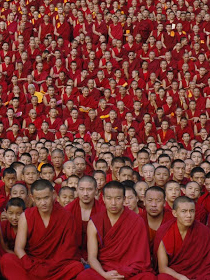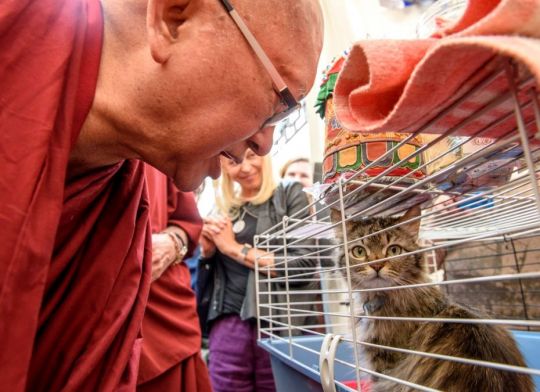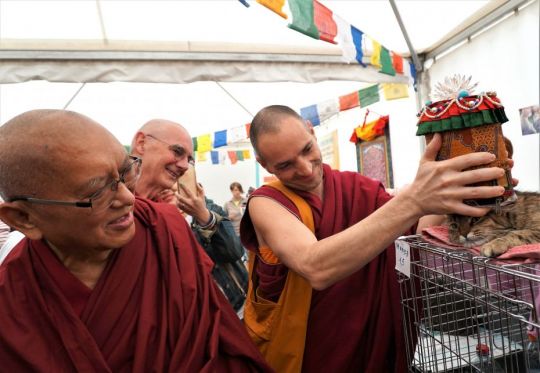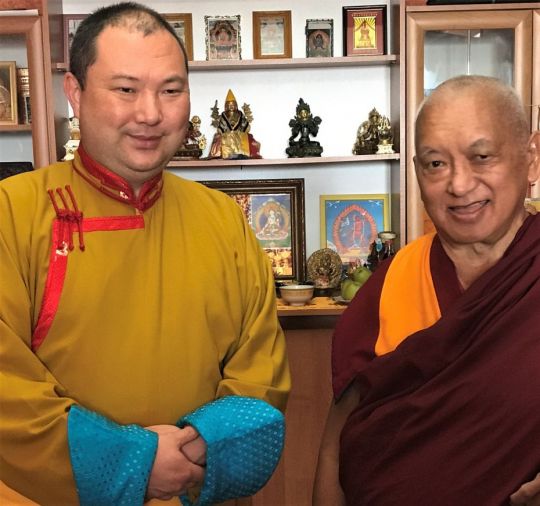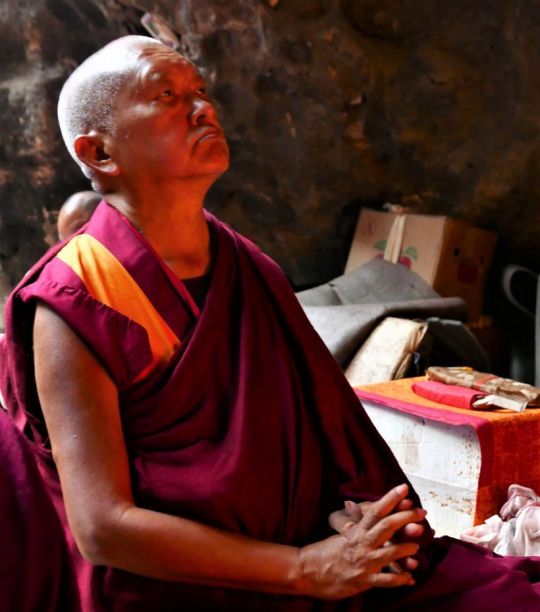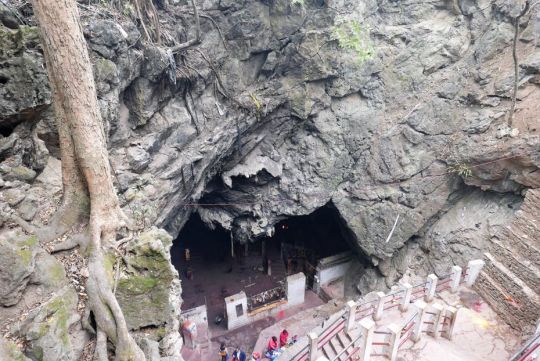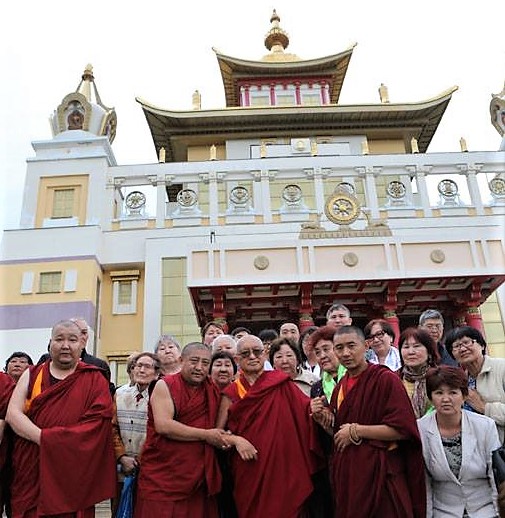- Home
- FPMT Homepage
Foundation for the Preservation of the Mahayana Tradition
The FPMT is an organization devoted to preserving and spreading Mahayana Buddhism worldwide by creating opportunities to listen, reflect, meditate, practice and actualize the unmistaken teachings of the Buddha and based on that experience spreading the Dharma to sentient beings. We provide integrated education through which people’s minds and hearts can be transformed into their highest potential for the benefit of others, inspired by an attitude of universal responsibility and service. We are committed to creating harmonious environments and helping all beings develop their full potential of infinite wisdom and compassion. Our organization is based on the Buddhist tradition of Lama Tsongkhapa of Tibet as taught to us by our founders Lama Thubten Yeshe and Lama Thubten Zopa Rinpoche.
- Willkommen
Die Stiftung zur Erhaltung der Mahayana Tradition (FPMT) ist eine Organisation, die sich weltweit für die Erhaltung und Verbreitung des Mahayana-Buddhismus einsetzt, indem sie Möglichkeiten schafft, den makellosen Lehren des Buddha zuzuhören, über sie zur reflektieren und zu meditieren und auf der Grundlage dieser Erfahrung das Dharma unter den Lebewesen zu verbreiten.
Wir bieten integrierte Schulungswege an, durch denen der Geist und das Herz der Menschen in ihr höchstes Potential verwandelt werden zum Wohl der anderen – inspiriert durch eine Haltung der universellen Verantwortung und dem Wunsch zu dienen. Wir haben uns verpflichtet, harmonische Umgebungen zu schaffen und allen Wesen zu helfen, ihr volles Potenzial unendlicher Weisheit und grenzenlosen Mitgefühls zu verwirklichen.
Unsere Organisation basiert auf der buddhistischen Tradition von Lama Tsongkhapa von Tibet, so wie sie uns von unseren Gründern Lama Thubten Yeshe und Lama Thubten Zopa Rinpoche gelehrt wird.
- Bienvenidos
La Fundación para la preservación de la tradición Mahayana (FPMT) es una organización que se dedica a preservar y difundir el budismo Mahayana en todo el mundo, creando oportunidades para escuchar, reflexionar, meditar, practicar y actualizar las enseñanzas inconfundibles de Buda y en base a esa experiencia difundir el Dharma a los seres.
Proporcionamos una educación integrada a través de la cual las mentes y los corazones de las personas se pueden transformar en su mayor potencial para el beneficio de los demás, inspirados por una actitud de responsabilidad y servicio universales. Estamos comprometidos a crear ambientes armoniosos y ayudar a todos los seres a desarrollar todo su potencial de infinita sabiduría y compasión.
Nuestra organización se basa en la tradición budista de Lama Tsongkhapa del Tíbet como nos lo enseñaron nuestros fundadores Lama Thubten Yeshe y Lama Zopa Rinpoche.
A continuación puede ver una lista de los centros y sus páginas web en su lengua preferida.
- Bienvenue
L’organisation de la FPMT a pour vocation la préservation et la diffusion du bouddhisme du mahayana dans le monde entier. Elle offre l’opportunité d’écouter, de réfléchir, de méditer, de pratiquer et de réaliser les enseignements excellents du Bouddha, pour ensuite transmettre le Dharma à tous les êtres. Nous proposons une formation intégrée grâce à laquelle le cœur et l’esprit de chacun peuvent accomplir leur potentiel le plus élevé pour le bien d’autrui, inspirés par le sens du service et une responsabilité universelle. Nous nous engageons à créer un environnement harmonieux et à aider tous les êtres à épanouir leur potentiel illimité de compassion et de sagesse. Notre organisation s’appuie sur la tradition guéloukpa de Lama Tsongkhapa du Tibet, telle qu’elle a été enseignée par nos fondateurs Lama Thoubtèn Yéshé et Lama Zopa Rinpoché.
Visitez le site de notre Editions Mahayana pour les traductions, conseils et nouvelles du Bureau international en français.
Voici une liste de centres et de leurs sites dans votre langue préférée
- Benvenuto
L’FPMT è un organizzazione il cui scopo è preservare e diffondere il Buddhismo Mahayana nel mondo, creando occasioni di ascolto, riflessione, meditazione e pratica dei perfetti insegnamenti del Buddha, al fine di attualizzare e diffondere il Dharma fra tutti gli esseri senzienti.
Offriamo un’educazione integrata, che può trasformare la mente e i cuori delle persone nel loro massimo potenziale, per il beneficio di tutti gli esseri, ispirati da un’attitudine di responsabilità universale e di servizio.
Il nostro obiettivo è quello di creare contesti armoniosi e aiutare tutti gli esseri a sviluppare in modo completo le proprie potenzialità di infinita saggezza e compassione.
La nostra organizzazione si basa sulla tradizione buddhista di Lama Tsongkhapa del Tibet, così come ci è stata insegnata dai nostri fondatori Lama Thubten Yeshe e Lama Zopa Rinpoche.
Di seguito potete trovare un elenco dei centri e dei loro siti nella lingua da voi prescelta.
- 欢迎 / 歡迎
简体中文
“护持大乘法脉基金会”( 英文简称:FPMT。全名:Foundation for the Preservation of the Mahayana Tradition) 是一个致力于护持和弘扬大乘佛法的国际佛教组织。我们提供听闻,思维,禅修,修行和实证佛陀无误教法的机会,以便让一切众生都能够享受佛法的指引和滋润。
我们全力创造和谐融洽的环境, 为人们提供解行并重的完整佛法教育,以便启发内在的环宇悲心及责任心,并开发内心所蕴藏的巨大潜能 — 无限的智慧与悲心 — 以便利益和服务一切有情。
FPMT的创办人是图腾耶喜喇嘛和喇嘛梭巴仁波切。我们所修习的是由两位上师所教导的,西藏喀巴大师的佛法传承。
繁體中文
護持大乘法脈基金會”( 英文簡稱:FPMT。全名:Found
ation for the Preservation of the Mahayana Tradition ) 是一個致力於護持和弘揚大乘佛法的國際佛教組織。我們提供聽聞, 思維,禪修,修行和實證佛陀無誤教法的機會,以便讓一切眾生都能 夠享受佛法的指引和滋潤。 我們全力創造和諧融洽的環境,
為人們提供解行並重的完整佛法教育,以便啟發內在的環宇悲心及責 任心,並開發內心所蘊藏的巨大潛能 — 無限的智慧與悲心 – – 以便利益和服務一切有情。 FPMT的創辦人是圖騰耶喜喇嘛和喇嘛梭巴仁波切。
我們所修習的是由兩位上師所教導的,西藏喀巴大師的佛法傳承。 察看道场信息:
- FPMT Homepage
- News/Media
-
- Study & Practice
-
-
- About FPMT Education Services
- Latest News
- Programs
- New to Buddhism?
- Buddhist Mind Science: Activating Your Potential
- Heart Advice for Death and Dying
- Discovering Buddhism
- Living in the Path
- Exploring Buddhism
- FPMT Basic Program
- FPMT Masters Program
- FPMT In-Depth Meditation Training
- Maitripa College
- Lotsawa Rinchen Zangpo Translator Program
- Universal Education for Compassion & Wisdom
- Online Learning Center
-
- Prayers & Practice Materials
- Overview of Prayers & Practices
- Full Catalogue of Prayers & Practice Materials
- Explore Popular Topics
- Benefiting Animals
- Chenrezig Resources
- Death & Dying Resources
- Lama Chopa (Guru Puja)
- Lama Zopa Rinpoche: Compendium of Precious Instructions
- Lama Zopa Rinpoche: Life Practice Advice
- Lama Zopa Rinpoche Practice Series
- Lamrim Resources
- Mantras
- Prayer Book Updates
- Purification Practices
- Sutras
- Thought Transformation (Lojong)
- Audio Materials
- Dharma Dates - Tibetan Calendar
- Translation Services
- Publishing Services
- Ways to Offer Support
- Prayers & Practice Materials
-
- Teachings and Advice
- Find Teachings and Advice
- Lama Zopa Rinpoche Advice Page
- Lama Zopa Rinpoche: Compendium of Precious Instructions
- Lama Zopa Rinpoche Video Teachings
- ༧སྐྱབས་རྗེ་བཟོད་པ་རིན་པོ་ཆེ་མཆོག་ནས་སྩལ་བའི་བཀའ་སློབ་བརྙན་འཕྲིན།
- Podcasts
- Lama Yeshe Wisdom Archive
- Buddhism FAQ
- Dharma for Young People
- Resources on Holy Objects
- Teachings and Advice
-
-
*If a menu item has a submenu clicking once will expand the menu clicking twice will open the page.
-
-
- Centers
-
- Teachers
-
- Projects
-
-
-
-
*If a menu item has a submenu clicking once will expand the menu clicking twice will open the page.
-
-
- FPMT
-
-
-
-
-
Dharma is a total way of life. It’s not just for breakfast, Sundays, or the temple. If you’re subdued and controlled in the temple but aggressive and uncontrolled outside of it, your understanding of Dharma is neither continuous nor indestructible.
Lama Yeshe
-
-
-
- Shop
-
-
-
The Foundation Store is FPMT’s online shop and features a vast selection of Buddhist study and practice materials written or recommended by our lineage gurus. These items include homestudy programs, prayers and practices in PDF or eBook format, materials for children, and other resources to support practitioners.
Items displayed in the shop are made available for Dharma practice and educational purposes, and never for the purpose of profiting from their sale. Please read FPMT Foundation Store Policy Regarding Dharma Items for more information.
-
-
Lama Zopa Rinpoche News and Advice
21
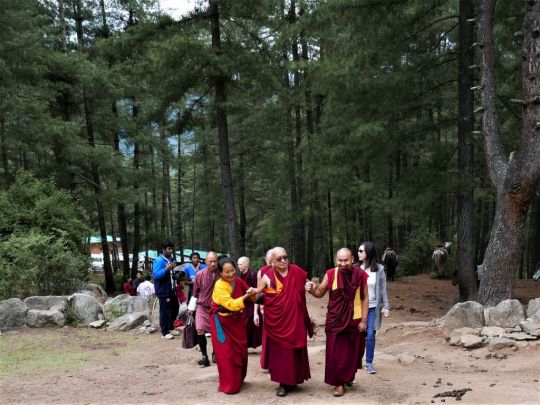
Lama Zopa Rinpoche and Khadro-la (Rangjung Neljorma Khadro Namsel Drönme) in the woods at the base of the trail to Taktsang Monastery, Bhutan, May 2016. Photo by Ven. Roger Kunsang.
Lama Zopa Rinpoche has commented several times on environmental issues, including climate change. What has he said?
In 2006, Rinpoche, concerned about climate change, saw the film An Inconvenient Truth, and made the following comments:
“Every sentient being, regardless of religion or nationality, including creatures of the land and sea, all [want] to be free of the impure substances, pollution, and the atomic bomb that are harmful to all of us and the environment. … This includes beings such as nagas and worldly gods who are also involved in the elements, and who are harmed and even destroyed due to these man-made pollutions, harmful chemicals, and other things that are damaging the earth and air. [Those] who think only of personal profit without consideration for others and the environment are causing great danger to all of us—the country we live in and this whole world …
“Your happiness depends on others, and others’ happiness depends on you. We all have to live in this world, so we need to be harmonious and happy in a healthy way. No matter who you are or where you are, we all have a responsibility to protect this world.”
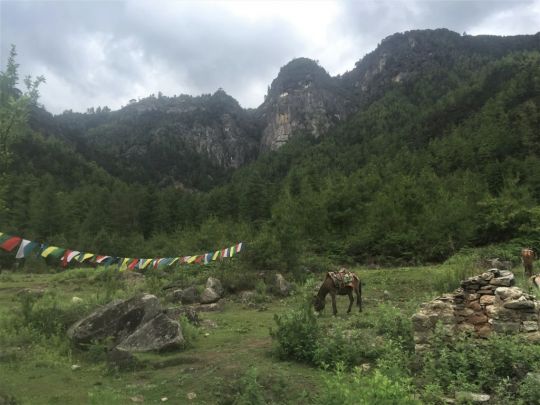
The view towards Taktsang Monastery in the mountains of Bhutan, June 2016. Photo by Ven. Roger Kunsang.
Rinpoche added in a letter to a student in 2006 that “global warming must also be related to there being a lot of factories. I think smoke from certain materials, certain bad and impure substances, affect global warming. … We must try and abandon the ones that are proved to affect global warming. From one’s own side, we should try to do this and make less pollution, then that’s our contribution to peace, without adding to the destruction of the world …”
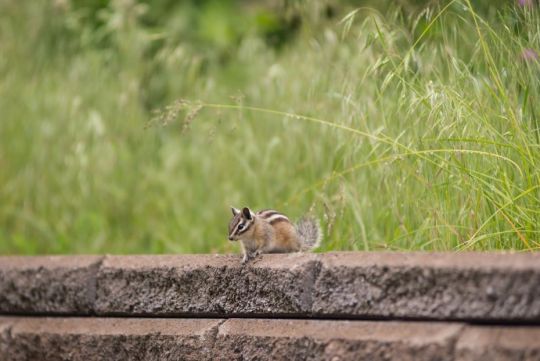
Chipmunk at Buddha Amitabha Pure Land, Washington State, US, June 2015. Photo by Chris Majors.
In 2009, Rinpoche shared some additional thoughts on climate change. He said, “Regarding global warming, usually the real cause, karma, isn’t talked about. The reality is: nothing happens without relating to the mind. People think, ‘This is a natural disaster,’ but it doesn’t happen without a cause, and the main cause is karma … of course, there are conditions, such as pollution from cars, etc., that we commonly understand. But we have to understand there IS a reason, and that is our past negative thoughts and actions. … We don’t normally talk of karma in a general situation regarding the environment, but it is important to educate people.”
In conclusion, Rinpoche noted, “Regarding the environment, anything well proven scientifically is worth following through. [Nevertheless], the main thing is to understand how things come from the mind, how things are dependent arisings, how things are the consequence of past actions. So, the conclusion is that those people undertaking retreat, serious meditation, etc. can help the environment, can bless the earth.”
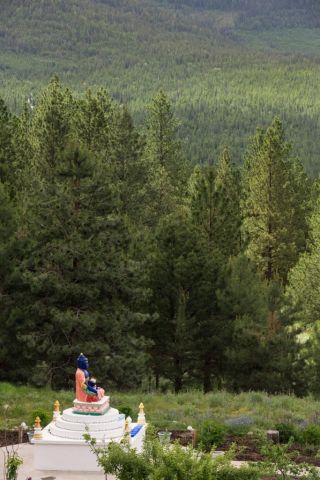
Buddha Amitabha Pure Land, where Lama Zopa Rinpoche often stays, Washington State, US, 2015. Photo by Chris Majors.
Lama Zopa Rinpoche is the spiritual director of the Foundation for the Preservation of Mahayana Tradition (FPMT), a Tibetan Buddhist organization dedicated to the transmission of the Mahayana Buddhist tradition and values worldwide through teaching, meditation and community service.
- Tagged: climate change, environment, karma, lama zopa rinpoche
19
During Lama Zopa Rinpoche’s May-June 2017 visit to Russia, Rinpoche took an entire day—May 31—to bless animals. The animal blessing was organized and hosted by Save Tibet Russia. It was well attended, with hundreds of people and animals in attendance: cats and dogs of course, but also tarantulas, birds, rodents, and snakes. Cats from a local cat shelter were brought in as well, in hopes some homes could be found for them, and Rinpoche blessed all of the shelter cats. It was reported that several cats found new homes.
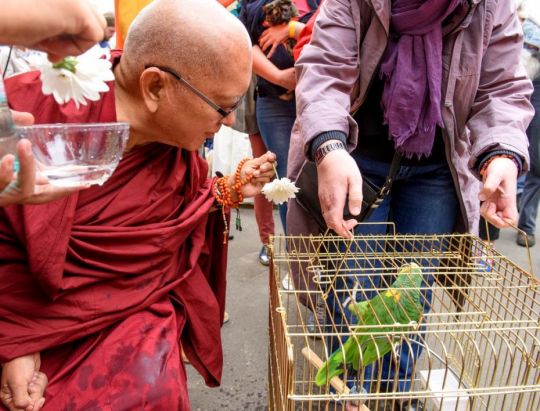
Lama Zopa Rinpoche blessing animals and birds, Moscow, Russia, May 2017. Photo by Renate Alyaudinov.
During the two hours Rinpoche spent at the event, he gave a short but compelling teaching on the whole path to enlightenment, as well as oral transmissions of mantras. He also recited mantras on a loudspeaker so that the animals would hear them from him and receive the transmission. The organizers had set up an altar just the way Rinpoche likes them, with the Kangyur, relics, and statues on it. After the blessing and the mantras, the animals were all taken around it to absorb its blessings. Then Rinpoche blessed all the animals with blessed water and relics he had with him, as well as a prayer wheel. The heartwarming event was livestreamed.
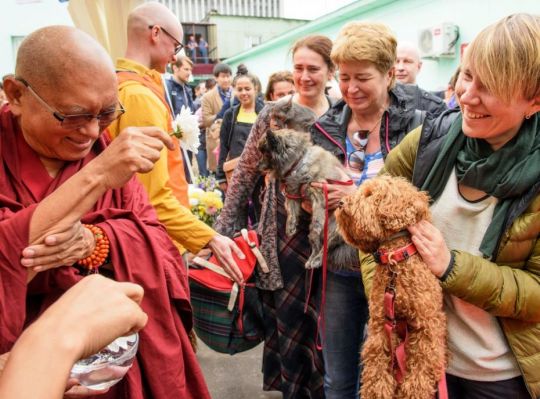
Lama Zopa Rinpoche blessing dogs while other animals wait their turn, Moscow, Russia, May 2017. Photo by Renate Alyaudinov.
Early in his teaching at the event, Rinpoche explained the importance of both morality and charity, saying, “Why do we have a human rebirth? Why? Not animal rebirth, why do we have a human rebirth this time? Especially the perfect human rebirth … Why we are living in a house and have food, and clothing, and enjoyments, that is because in past life we made charity … The omniscient one explained in the teachings that from pure morality comes higher rebirth: … having a human shape of body, that comes from pure morality. And then all wealth, all enjoyments come from charity.” One form of charity is the giving of mantras and blessings.
Rinpoche explained the benefits of blessing animals during his teaching, saying, “The Buddha explained all the benefits of mantra… The mantra is to liberate them from suffering. Just having heard mantras plants the seeds of a fully awakened mind, the total cessation of obscurations and the completion of realizations; mantras plant seeds for that.”
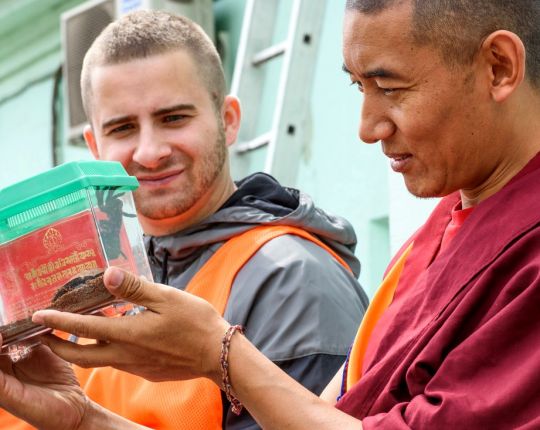
Ven. Sangpo, Lama Zopa Rinpoche’s attendant, examines an unusual pet during Rinpoche’s animal blessing event, Moscow, Russia, May 2017. Photo by Renate Alyaudinov.
On the Chenrezig mantra in particular, Rinpoche added, “Chenrezig, Compassion Buddha’s mantra, this mantra OM MANI PADME HUM … in one text it is mentioned, the benefits of Chenrezig mantra, if you see Chenrezig mantra OM MANI PADME HUM it becomes your last rebirth in samsara. If you see OM MANI PADME HUM therefore in Solu Khumbu [where] it is carved in rock, you come up this way and go down this way so [walking] becomes circumambulation, rocks are carved with OM MANI PADME HUM and many different mantras, so much unbelievable benefit to the people and even animals, therefore so many rocks are carved…”
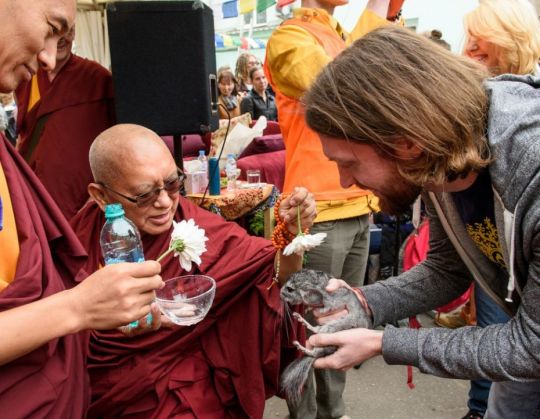
Pets come in all shapes and sizes… Lama Zopa Rinpoche blessing animals, Moscow, Russia, May 2017. Photo by Renate Alyaudinov.
Rinpoche continued, saying, “[The mantra] plants seeds of enlightenment in their minds, the kind, precious mother dogs, cats, all these. You visualize Chenrezig like a mountain, a snow mountain, then nectar and beams are emitted with loving kindness to you, to your mother precious dogs, cats, all sentient beings, then to those who are sick, who are dying now, think that Chenrezig sends beams, nectar and beams, to you and to precious dogs, cats, and people who are sick or dying, and to all the six realm sentient beings. Think that.”
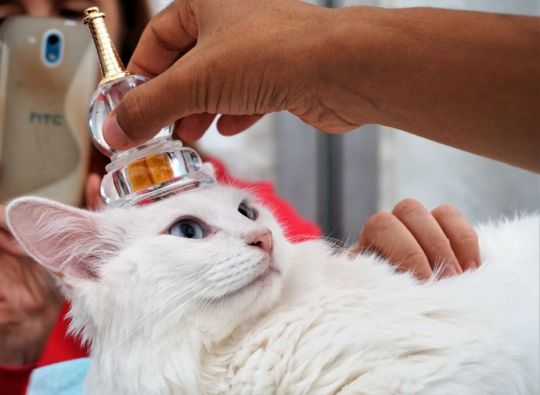
This blue-eyed beauty seems quite happy to receive a blessing, Moscow, Russia, May 2017. Photo by Ven. Lobsang Sherab.
During his evening teaching later, Rinpoche talked about the importance of caring for animals and being kind to them. He said that, as Buddhists having animals, it is important that we make their lives beneficial, giving them Dharma names, taking them around holy objects, blessing them with mantras, and so on.
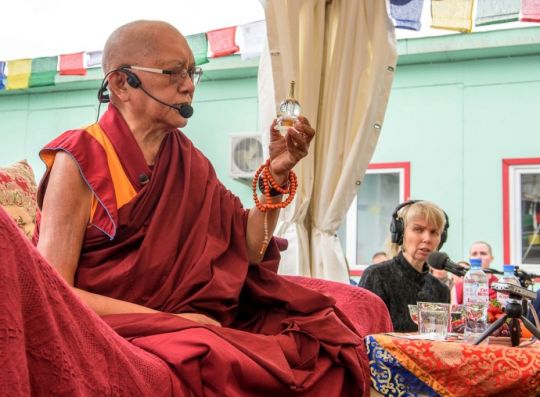
Lama Zopa Rinpoche during the animal blessing event, Moscow, Russia, May 2017. Photo by Renate Alyaudinov.
According to Rinpoche in his book Liberating Animals from the Danger of Death, sentient beings can experience purification of their karma and avoid the lower realms in the future as a result of such practices. Rinpoche says there: “When the Buddha gave teachings to 500 swans in a field, in their next life they were born as human beings. They became monks and all became arya beings, able to achieve the cessation of suffering and the true path. So the result is unbelievable, just by hearing Dharma words.”
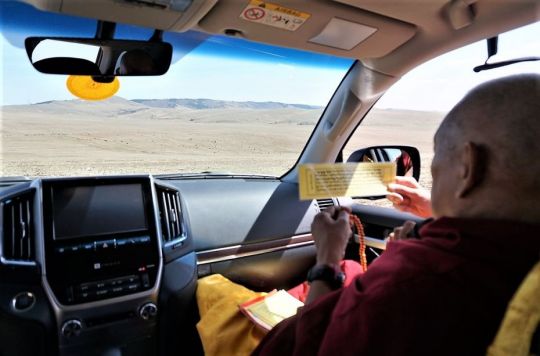
Lama Zopa Rinpoche blessing animals with mantras on the way to Darkhan, Mongolia, May 2017. Photo by Ven. Lobsang Sherab.
See more photos of Lama Zopa Rinpoche’s visit to Russia here:
https://photos.app.goo.gl/pGb9sPVNFRntUESB6
Watch videos and find transcripts from Lama Zopa Rinpoche’s teaching in Russia:
https://fpmt.org/media/streaming/teachings-of-lama-zopa-rinpoche/lama-zopa-rinpoche-teachings-in-russia-2017/
Benefiting animals is one of Lama Zopa Rinpoche’s Vast Visions for FPMT. Read about it here:
https://fpmt.org/fpmt/vast-vision/#animal
and: https://fpmt.org/tag/animals/
Get Liberating Animals from the Danger of Death as an e-book or in a print copy from the Foundation Store and support FPMT International Office:
https://shop.fpmt.org/Liberating-Animals-eBook_p_2334.html.
Lama Zopa Rinpoche is the spiritual director of the Foundation for the Preservation of Mahayana Tradition (FPMT), a Tibetan Buddhist organization dedicated to the transmission of the Mahayana Buddhist tradition and values worldwide through teaching, meditation and community service.
- Tagged: animals, lama zopa rinpoche, mantras, russia
14
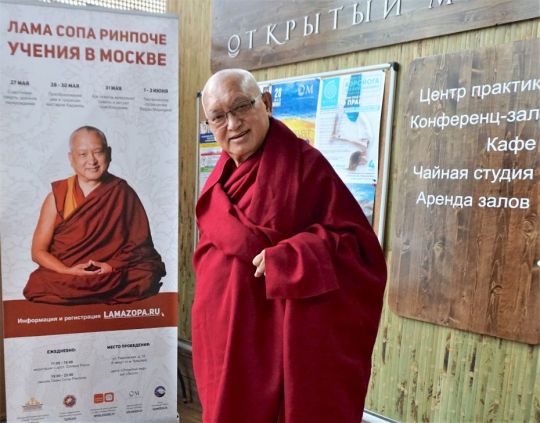
Lama Zopa Rinpoche at the teaching venue in Moscow, Russia, May 2017. Photo by Ven. Lobsang Sherab.
Lama Zopa Rinpoche gave a week of evening teachings in Moscow, May 27 through June 3. Ganden Tendar Ling, the FPMT center in Moscow, organized the teaching event, which was held in a large public hall and livestreamed.
Rinpoche began his first day of teachings on the topic of death and dying, drawing from his book How to Enjoy Death. The Russian edition of this book was officially launched during his visit.
Rinpoche ended up teaching on this essential topic for most of the three-day period, in place of the planned Kadampa teachings. Ven. Holly Ansett reported that this was “an exceptional teaching on integrating the five powers in this lifetime as well as at the time of death.” She added that on the last day he taught one verse from the Kadampa teachings.
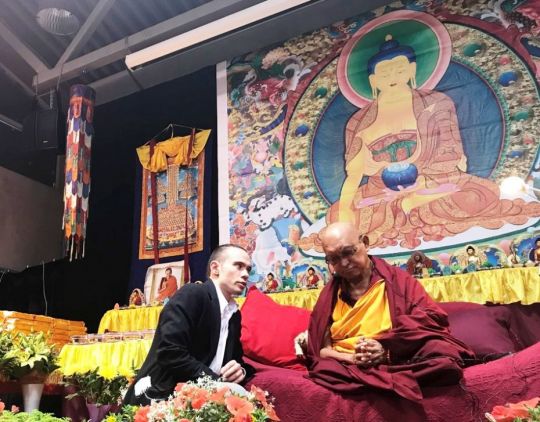
Lama Zopa Rinpoche during teachings in Moscow, listening to question from audience being translated from Russian to English, Russia, May 2017. Photo by Ven. Roger Kunsang.
Approximately 700 people attended the first day of teaching. On the second day, a residential retreat began, led by Ven. Olivier Rossi, Ganden Tendar Ling’s visiting teacher. This gave attendees an opportunity to go deeper into practice with Ven. Olivier, who led prayers and meditations, conducted Q&A sessions, and reviewed the material taught by Rinpoche. Between 500 and 600 people attended the retreat and the following days of Rinpoche’s teachings.
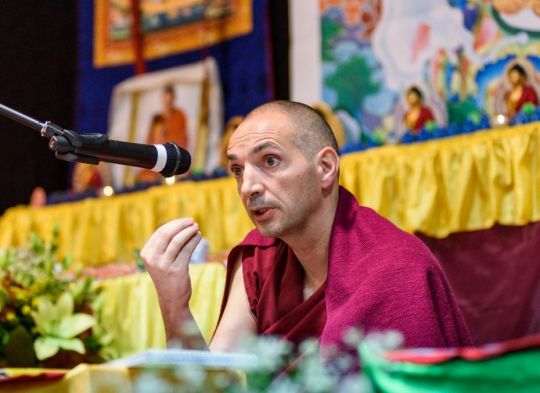
Ven. Olivier Rossi explaining the teachings, Moscow, Russia, May 2017. Photo by Renate Alyaudinov.
From June 1 to June 3, Rinpoche gave preparatory teachings and conducted a Medicine Buddha initiation. While Rinpoche was in Moscow, the city experienced a severe thunderstorm with hurricane-strength winds, which was responsible for the deaths of sixteen people. Hundreds of trees were blown down, and one smashed a car in front of the venue where Rinpoche was teaching. There were no injuries among those attending the teachings.
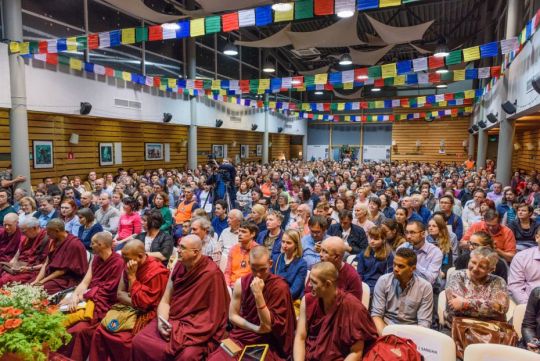
The first day of Lama Zopa Rinpoche’s teachings in Moscow, organized by Ganden Tendar Ling, Russia, May 2017. Photo by Renate Alyaudinov.
Rinpoche walked each day both ways between the venue where he taught and the Christian monastery where he was staying. It is a route where there are beggars, and Rinpoche made offerings to them every day with great respect, holding out his gifts with both hands. To each person, he requested that they use the money for food and not alcohol. Sometimes he offered food directly. The beggars quickly recognized Rinpoche and became happy every time they saw him. And people from the retreat also began giving to the beggars because Rinpoche, in one of his teachings, said how important it was to help people in need.
More than fifty volunteers contributed to making the week of teachings with Rinpoche a success. According to Ven. Holly Ansett, “The whole event was really well organized. Everything worked out very well—very successful, and very harmonious!”
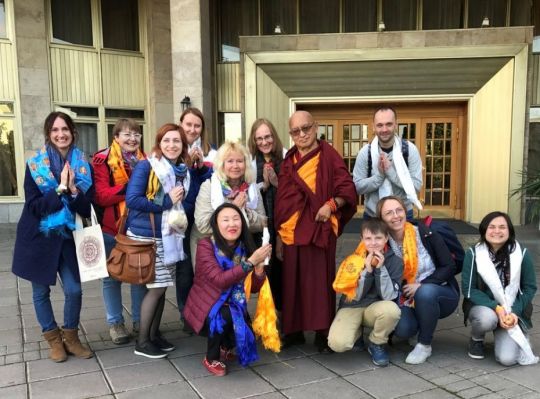
Rinpoche and students in Moscow, including Elena Bartanova from St. Petersberg, coordinator of Aryadeva Study Group, Russia, May 2017. Photo by Ven. Roger Kunsang.
Watch videos and find transcripts from Lama Zopa Rinpoche’s teaching in Russia:
https://fpmt.org/media/streaming/teachings-of-lama-zopa-rinpoche/lama-zopa-rinpoche-teachings-in-russia-2017/
Lama Zopa Rinpoche is the spiritual director of the Foundation for the Preservation of Mahayana Tradition (FPMT), a Tibetan Buddhist organization dedicated to the transmission of the Mahayana Buddhist tradition and values worldwide through teaching, meditation, and community service.
- Tagged: how to enjoy death, lama zopa rinpoche, russia
12
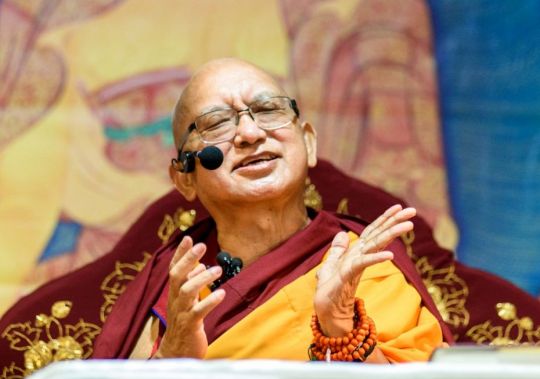
Lama Zopa Rinpoche at the second day of his teachings in Moscow organized by Ganden Tendar Ling. Russia, May 2017, Photo by Renat Alyaudinov.
While Lama Zopa Rinpoche was in Kalmykia, Russia, in May 2017, a traditionally Buddhist area of Russia settled centuries ago by migrants from Mongolia, he stayed at the former home of Geshe Tenzin Dugda (Tib.’brug-sgra), a Tibetan geshe who lived in Kalmykia for many years. Lama Zopa Rinpoche had known Geshe Dugda in the 1960s.
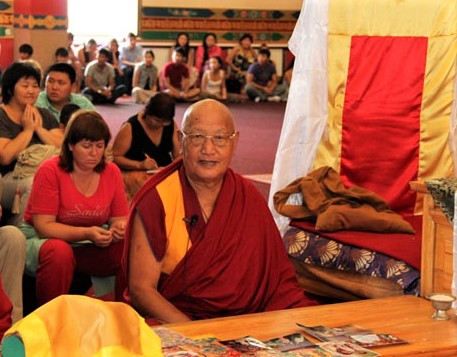
Geshe Tenzin Dugda in Kalmykia, 2011. Photo courtesy of kalmykia.eu.
Geshe Dugda (1938-2012) was part of the first generation of Tibetan exiles who fled Tibet in 1959 to follow His Holiness the Dalai Lama into exile. He left Tibet at the age of 20, and later helped rebuild Drepung Gomang monastery in the southern Indian state of Karnataka. After years of dedicated work rebuilding the monastery as well as completing his studies, he received the geshe lharampa degree, the highest academic qualification in the Gelugpa tradition. In 1995, Geshe Dugda moved to Kalmykia on the advice of His Holiness the Dalai Lama, becoming the first geshe in the small republic. He spent 17 years helping to revive Buddhism in Kalmykia, including building temples and bestowing numerous teachings and initiations. He gained large numbers of Dharma students, not only from Kalmykia, but also from other regions of Russia. He continues to be revered in Kalmykia for his warmth and kindness as well as his contributions to the restoration of Buddhism. When Geshe Dugda died, he remained on his meditation seat for four days.
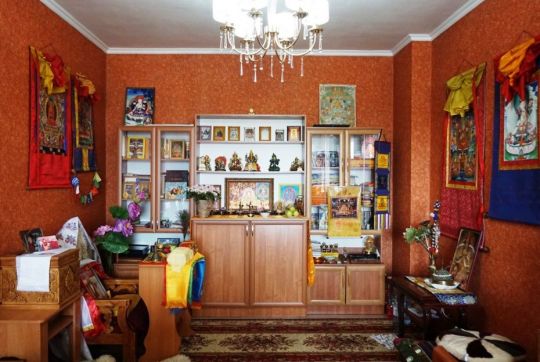
The house where Lama Zopa Rinpoche stayed in Elista, where Geshe Dugda lived. This is his altar. Elista, Kalmykia, Russia, May 2017. Photo by Ven. Lobsang Sherab.
Lama Zopa Rinpoche spoke about Geshe Dugda on May 30, 2017, during his teachings in Moscow, mentioning that Geshe Dugda had been present when Rinpoche and Lama Yeshe first met Zina Rachevsky in Ghoom, near Darjeeling, India. Here is what Rinpoche said:
There were two monasteries in Ghoom, one built by the Indian government, I don’t know the story, and the one where the monks who came from Tibet lived. One time my teacher, Lama Yeshe, was there in the room with my teacher, other teacher, who helped me in Tibet become a monk at Domo Geshe’s monastery and … brought me to India.
Later on, one monk who lived in Kalmykia and taught, was leading vinaya practice, reviving sojong in the monastery, he taught Dharma for so many years in Kalmykia, he was there, he spoke English few words, he thought the lady was my friend, her name was Princess Zina Rachevsky… [Kopan] started from her. The monk Dugda opened the door a little bit, saying, “Oh, here is your friend”. She came with blond hair, wearing a Tibetan sweater sold at the Darjeeling bus station, simple sweater, blonde hair, she came inside. Actually she didn’t come for us, came for Domo Geshe who had passed away, because she read Lama Govinda book, three books, he went in Tibet and met Domo Geshe, told his story, so she came to look for Domo Geshe.

Zina Rachevsky, possibly 1967. (Photo used with permission of the estate of Zina Rachevsky.)
But Dugda, the monk, misunderstood, and thought she was my friend. Lama Yeshe put big mug, then big kettle, then offered full, she drank, that day she drank completely. Since from that time for many years I never saw her drink Tibetan [butter] tea … she came for one hour to discuss, I knew some English words and I tried to translate for Lama Yeshe. Then after one month she invited us to Darjeeling to her house … nine months we lived like that, then she went to Sri Lanka, from Buxa, we were supposed to go to Sri Lanka to start a Dharma center, but that time relation not good with India so we didn’t go. Then Lama said go to Nepal, then started like that Kopan Monastery, Lama built Kopan and I built Lawudo at the same time. From there we started one month course. … This is because we met the first student, Princess Zina Rachevsky … .
Started from Geshe Dugda who lived in Kalmykia, taught many students, he died two or three years ago, he would have been so happy to meet me in Kalmykia but he died before I came. I felt sorry about that.
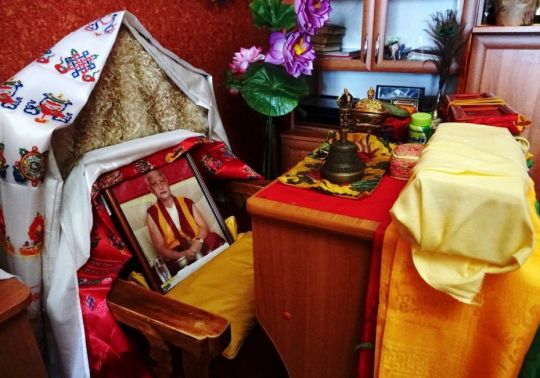
The meditation seat of Geshe Tenzin Dugda where he sat in meditation after passing away in 2012. Elista, Kalmykia, Russia, May 2017. Photo by Ven. Lobsang Sherab.
Watch videos and find transcripts from Lama Zopa Rinpoche’s teaching in Russia:
https://fpmt.org/media/streaming/teachings-of-lama-zopa-rinpoche/lama-zopa-rinpoche-teachings-in-russia-2017/
Lama Zopa Rinpoche is the spiritual director of the Foundation for the Preservation of Mahayana Tradition (FPMT), a Tibetan Buddhist organization dedicated to the transmission of the Mahayana Buddhist tradition and values worldwide through teaching, meditation, and community service.
- Tagged: geshe dugda, kalmykia, russia, zina rachevsky
7
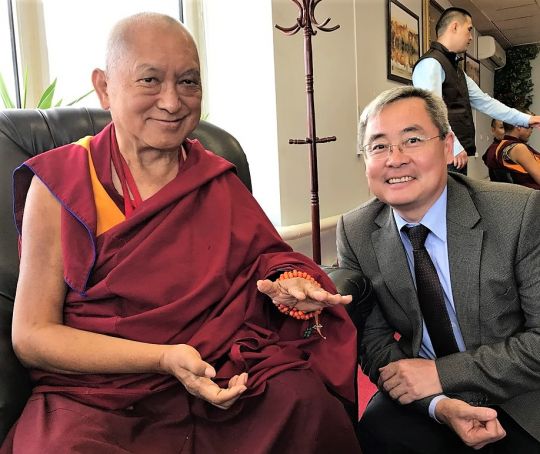
Lama Zopa Rinpoche with the Minister of Culture of Kalmykia, Hondor Badmaevich, Kalmykia, Russia, May 2017. Photo by Ven. Roger Kunsang.
From May 20 to 24, 2017, Lama Zopa Rinpoche taught in Elista, the capital of the Republic of Kalmykia, an autonomous region within Russia. Rinpoche taught on Atisha’s Lamp of the Path and gave two initiations. He also attended performances of traditional music and dance (see videos below).
Kalmykia is a Buddhist area whose people are descendants of migrants from Mongolia. Rinpoche was hosted there by Telo Rinpoche, the spiritual leader of the Kalmyk people, who organized Rinpoche’s visit and teachings. American-born tulku Telo Rinpoche has been active in the reestablishment of Buddhism in Kalmykia since being chosen as its head lama in 1992. He also serves as the honorary representative of His Holiness the Dalai Lama in Russia.
Lama Zopa Rinpoche was greeted with great warmth and respect as soon as he crossed the border into the small republic. A group of Kalmyks, including a geshe, ordained Sangha, and numerous people in local costume, had driven for several hours to welcome him to Kalmykia and offer him tea. Rinpoche also received a grand welcome when he arrived in the capital, Elista.
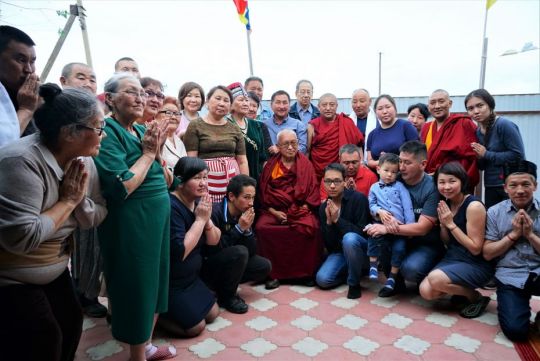
After lunch on the way to Elista, Rinpoche posed for photos with the family who offered lunch and others, Kalmykia, Russia, May 2017.
In Elista, Rinpoche stayed at the former home of the late Geshe Tenzin Dugda (Tib.’brug-sgra), who passed away in 2012. Geshe Dugda, born in Tibet in 1938, moved to Kalmykia in 1995 at His Holiness’s request, and played an important role in re-establishing Buddhism there.
Rinpoche gave teachings in a temple built in Elista in 2005 called the Golden Abode of the Buddha Shakyamuni, one of the largest Buddhist temples in Europe.
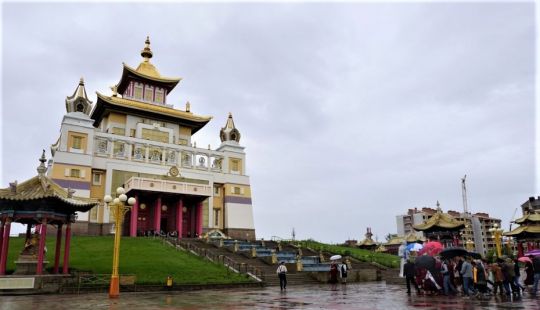
Lama Zopa Rinpoche and others approach the Golden Abode of Shakyamuni Buddha, the temple in Elista, Kalmykia, Russia, May 2017. Photo by Ven. Lobsang Sherab.
Rinpoche’s assistant, Ven. Roger Kunsang, reported that the visit to Kalmykia went very well, with more than a thousand people attending teachings and initiations, including the Kalmyk minister of culture. Kalmyk attendees were deeply grateful for Rinpoche’s visit and expressed enthusiastic devotion for him, as well as requesting him to return as soon as possible. Rinpoche mentioned that he would like to have a 100 million mani retreat take place regularly in Kalmykia.
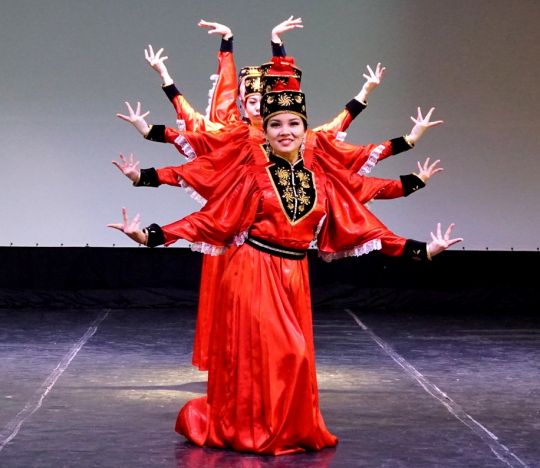
Kalmyk dance offered to Lama Zopa Rinpoche, Elista, Kalmykia, Russia, May 2017. Photo by Ven. Lobsang Sherab.
Also while in Elista, Rinpoche enjoyed a beautiful cultural dance and song offering (see videos below). Afterwards, Rinpoche blessed all the dancers and musicians as well as all who were in the theater for the performance.
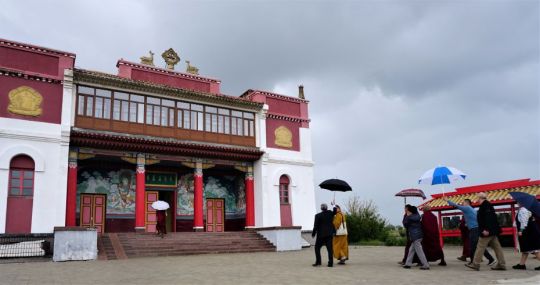
Lama Zopa Rinpoche visiting the older temple in Elista, where the monks live, Kalmykia, Russia, May 2017. Photo by Ven. Lobsang Sherab.
Kalmykia is in the southwest of the European part of Russia, north of Georgia and bordering the Caspian Sea. There are approximately 150-200,000 ethnic Kalmyks. Telo Rinpoche has been working there to restore Buddhism—suppressed for decades—since becoming head lama in 1992. There are now many Buddhist temples in Kalmykia, and numerous young Kalmyk men are being trained at Tibetan monasteries in India.
The Maitreya Project Heart Shrine Relic Tour visited Kalmykia in 2008. Read more about that visit, and the recent history of Buddhism in Kalmykia, here.
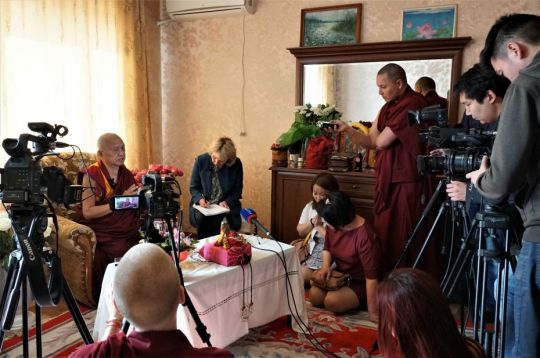
Lama Zopa Rinpoche at a press conference with all the media of Elista, Kalmykia, Russia, May 2017. Photo by Ven. Lobsang Sherab.
Watch four short YouTube videos of the Kalmyk cultural performances attended by Rinpoche here:
https://youtu.be/nxyYToloWS8
https://youtu.be/Genb0XRa_vM
https://youtu.be/l9PHu5XyoAw
https://youtu.be/vbuNnAVvo5k
See more photos from Rinpoche’s visit to Kalmykia in this new FPMT photo gallery:
https://photos.app.goo.gl/hSL4N47TdtX93ioPA
Read about Telo Rinpoche and the restoration of Buddhism in Kalmykia here:
https://fpmt.org/mandala/archives/mandala-for-2016/january/helping-buddhism-strengthen-and-grow-in-russia-an-interview-with-telo-rinpoche/
and here: https://fpmt.org/wp-content/uploads/sites/2/2008/12/Kalmykia.pdf
Lama Zopa Rinpoche is the spiritual director of the Foundation for the Preservation of Mahayana Tradition (FPMT), a Tibetan Buddhist organization dedicated to the transmission of the Mahayana Buddhist tradition and values worldwide through teaching, meditation and community service.
- Tagged: kalmykia, lama zopa rinpoche, russia, telo rinpoche, video, video short
5
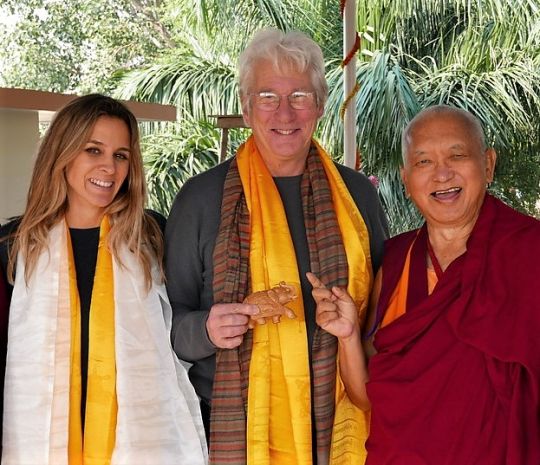
Lama Zopa Rinpoche with Richard Gere and Alejandra Silva at Root Institute, Bodhgaya, India, January 2017. Photo by Ven. Roger Kunsang.
Can our relationships help us progress on the path?
Lama Zopa Rinpoche says yes! Here is what he has said about relationships: “You should consider having a relationship to be an opportunity to practice Dharma … In particular, you should make sure that being together with someone becomes a cause of enlightenment by keeping in mind the motivation of bodhichitta. You should cherish, serve, and dedicate your life to your partner in the same way that you aspire to do for all sentient beings.
“You can use your relationship to practice morality by, for example, observing the five lay vows of abstaining from killing, stealing, adultery, lying, and mind-altering substances. Likewise, having a partner provides an opportunity for you to practice the other five perfections of giving, patience, perseverance, concentration, and wisdom. If you can do this, they will give you enlightenment …
“You can also think about your partner [like this]: ‘I have received every happiness experienced throughout beginningless lives from this person.’ Just that kindness is unimaginable, but on top of that, you also receive all your future happiness from them … Thinking in this way, the conclusion is that your partner is the most precious, most dear, and most kind person in your entire life.”
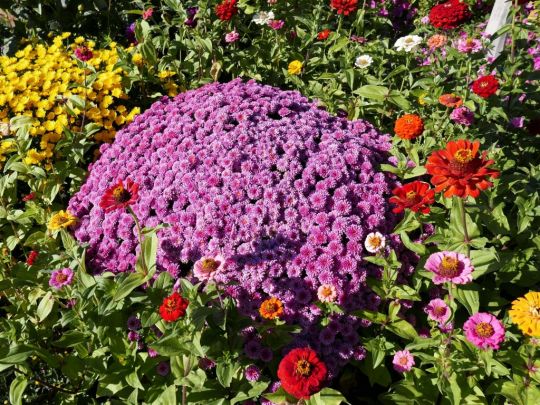
Flowers at Lama Zopa Rinpoche’s house at Buddha Amitabha Pure Land, Washington State, US, October 2016. Photo by Ven. Roger Kunsang.
Rinpoche added, “You should also keep in mind that in past lives, your present partner was your mother … By recognizing the vast kindness you’ve received from them, you will come to see yourself as their servant. Thinking in this way, your living together will become an opportunity to practice Dharma. With the attitude that the other person is most precious and kind, every single action you do will become a means of collecting extensive merit. If you also act with bodhichitta, you will collect limitless skies of merit and your actions will become the cause to achieve enlightenment for the benefit of all sentient beings. By thinking, ‘I am going to offer service to this person who is a most precious sentient being,’ you will collect a huge amount of merit every day and also purify defilements collected throughout beginningless lives. Since you will constantly create the cause for the biggest success—full enlightenment for all sentient beings—your life will be filled with happiness and hope.
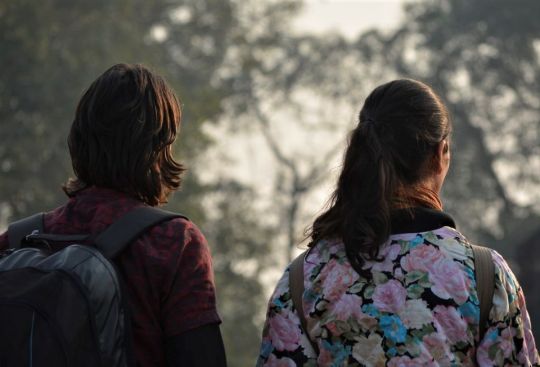
Ösel Hita and Indila Dora at Nalanda Monastery, India, January 2017. Photo by Kunchok Gyaltsen.
“When trying to understand the things that happen in a relationship, you need to take past karma into account … If you always remember to relate events to karma by thinking, ‘This is my karma’ and ‘This is their karma,’ a potential problem doesn’t even become a problem because you accept the situation. It does not bother you and there is peace in your heart.”
In conclusion, Rinpoche emphasized, “If you are able to make use of all your relationships to practice Dharma, you will lead a very healthy life … By thinking in the ways that I have explained here, you will be able to fully enjoy life. You will find satisfaction and fulfillment and you will experience inner peace and happiness.”
Rinpoche talks more about relationships in the video below.
Watch Rinpoche talk on YouTube about what matters for good relationships:
https://youtu.be/aU0-1IyPVvE
https://youtu.be/aU0-1IyPVvE
Find the complete teaching on making relationships meaningful:
https://lamayeshe.com/article/chapter/2-making-relationship-meaningful
See more videos of teachings by Lama Zopa Rinpoche at Rinpoche Available Now:
https://fpmt.org/media/streaming/teachings-of-lama-zopa-rinpoche/
Lama Zopa Rinpoche is the spiritual director of the Foundation for the Preservation of Mahayana Tradition (FPMT), a Tibetan Buddhist organization dedicated to the transmission of the Mahayana Buddhist tradition and values worldwide through teaching, meditation, and community service.
- Tagged: bodhichitta, lama zopa rinpoche, relationships, video
3
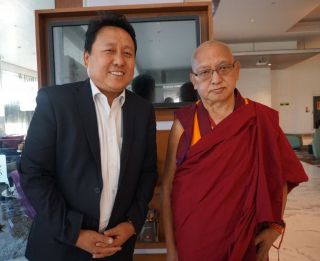
Lama Zopa Rinpoche with Chief Representative Chophel Thupten.
The Central Tibetan Administration (CTA) is an organization based in India with the stated goals of “rehabilitating Tibetan refugees and restoring freedom and happiness in Tibet.” The CTA attends to the welfare of the Tibetan exile community in India, who number around 100,000. It runs schools, health services, cultural activities and economic development projects for the Tibetan community as well as assists with legal issues which might arise for Tibetans in exile. More than 1,000 refugees still arrive each year from China, usually via Nepal.
Lama Zopa Rinpoche, through the Lama Zopa Rinpoche Bodhichitta Fund, recently offered a grant to the CTA office in Bangalore (known as the CTA South Zone). Chief Representative Chophel Thupten explained that it is quite difficult to fundraise for administrative and upkeep needs of the office, but the needs are vast. Rinpoche was very happy to help in this way and offered half of the amount needed for upcoming expenses.
Lama Zopa Rinpoche Bodhichitta Fund enables Rinpoche’s compassionate service to others to flourish. All the offerings from the fund are used toward the creation of holy objects around the world; sponsoring young tulkus, high lamas and Sangha in India, Nepal, Tibet and the West; supporting FPMT centers, projects and services; sponsoring Dharma retreats and events; funding animal liberations, and much more.
30
On his recent trip to Nepal, Lama Zopa Rinpoche visited the Maratika Caves, an important holy site associated with Padmasambhava (Guru Rinpoche).
Lama Zopa Rinpoche has visited Maratika on pilgrimage before and spoken about how good it is to do practice there. There are a number of caves in the area but the main cave for pilgrims is the Maratika Treasury Cave. It is here that Guru Rinpoche, with Mandarava, is said to have achieved immortality through the practice of Amitayus. In the main cave, there is a long-life vase (Tib. tse bum) made of stone, which Amitayus is said to have placed on the heads of Guru Rinpoche and Mandarava to bestow immortal life. This vase is the most holy object at Maratika. The cave also contains many self-created (Tib. rang jung) images and syllables. As well, it is considered that many spiritual treasures are hidden there. Texts say, for example, that Buddha Amitabha taught the eighteen tantras of long life at the request of Avalokiteshvara; dakinis wrote these down in symbolic script using melted lapis lazuli on golden paper, put them in a box made of five precious jewels, and concealed them at Maratika.
In 2009, Rinpoche shared the following about Maratika:
“This place, which is called Maratika, is greatly blessed, as the great master Padmasambhava meditated here on Amitayus (the long life deity) and actualized the state of deathlessness (the siddhi of immortal life). Apart from other lamas, the great Kyabje Trulshig Rinpoche [did] long life retreat every year here for His Holiness’s long life, which also greatly blesses the place. Especially, according to His Holiness the Dalai Lama, due to this accumulation of white virtue, just through seeing, hearing, remembering, and touching this place, the two obscurations of beings will quickly be purified, one will be looked after by the all-knowing one (the great master Padmasambhava) from Urgyen, and easily attain the state of omniscience. This holy place has many more infinite blessings than just explained, and every sick and afflicted being should go there.”
In 2016 while visiting the cave, Rinpoche translated a requesting prayer to Maratika, which has just been made available by FPMT Education Services. During Rinpoche’s 2016 pilgrimage to Maratika, Rinpoche received from Khenpo Gyurme Thegchog Gyaltsen a prayer he had composed called “A Requesting Prayer to Maratika: The Source of an Ocean of Siddhis.” Rinpoche translated this prayer into English and FPMT Education Services has recently published it. According to Ven. Sarah Thresher, who edited the English translation, the prayer “is a concise guide to the holy places and holy objects of Maratika in the form of a request. It also tells of the history and origin of the caves, the unique characteristics of the environment, the etymology of the place’s name, and the particular practices to be done.”
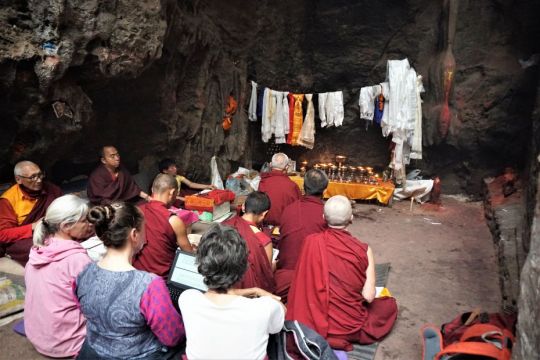
Rinpoche and others do practice inside the main Maratika cave, Nepal, April 2017. Photo by Ven. Lobsang Sherab.
Also while at Maratika recently, Rinpoche met with Ven. Tenzin Choegyal, the reincarnation of Ngawang Chöphel, known as the Maratika Lama, the main disciple of the Lawudo Lama, Rinpoche’s previous incarnation. Ven. Tenzin Choegyal is now seventeen years old and studies in Kathmandu at Shechen Monastery under Rabjam Rinpoche. Ngawang Chöphel’s son Lopön Karma Wangchug now looks after the monastery at Maratika.
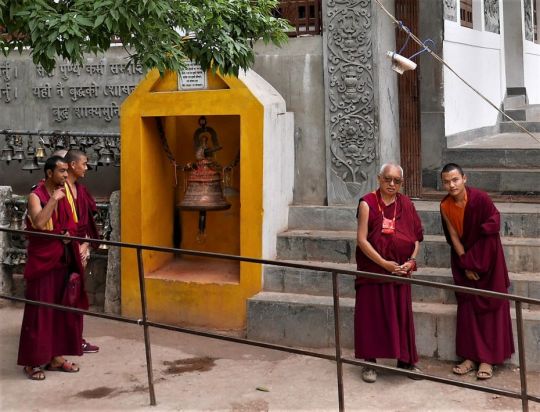
Lama Zopa Rinpoche with Ven. Tenzin Choegyal, the reincarnation of Ngawang Chöphel, the main disciple of the Lawudo Lama, Maratika, Nepal, April 2017. Photo by Ven. Roger Kunsang.
In addition to doing prayers and practices at Maratika, Rinpoche blessed several goats liberated last year who are taken care of nearby. FPMT’s Animal Liberation Fund is contributing towards the goats’ care, and while at Maratika, Rinpoche offered additional funds for their food and other necessities for the coming year.
Watch a video here made in 2016 of Rinpoche leading an extensive motivation for the goats’ liberation before blessing them by chanting various mantras, reciting beneficial prayers, and tying blessed red cloth around their necks. Rinpoche ends the practice with several dedication prayers.
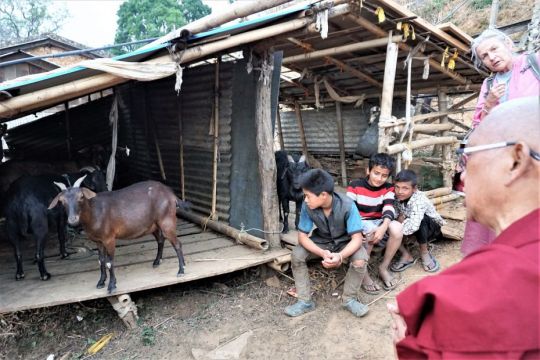
Rinpoche with liberated goats at Maratika, Nepal, April 2017. Photo by Ven. Lobsang Sherab.
“A Requesting Prayer to Maratika: The Source of an Ocean of Siddhis” can be found here:
https://shop.fpmt.org/A-Requesting-Prayer-to-Maratika-The-Source-of-an-Ocean-of-Siddhis-PDF_p_2919.html
Students interested in going on pilgrimage to Maratika Caves can contact Ven. Sarah Thresher through FPMT International Office for information and assistance.
Lama Zopa Rinpoche is the spiritual director of the Foundation for the Preservation of Mahayana Tradition (FPMT), a Tibetan Buddhist organization dedicated to the transmission of the Mahayana Buddhist tradition and values worldwide through teaching, meditation and community service.
- Tagged: lama zopa rinpoche, maratika cave, nepal, padmasambhava, pilgrimage
29
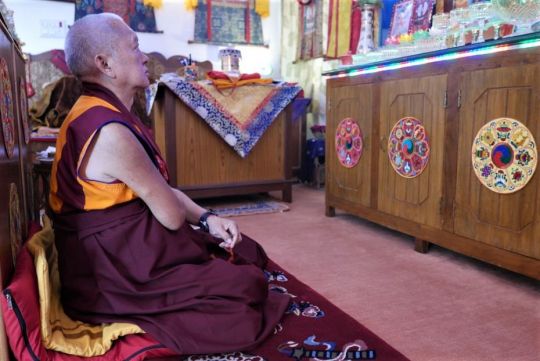
Lama Zopa Rinpoche meditating in his room in Root Institute, Bodhgaya, India. February 2017. Photo by Ven. Roger Kunsang.
In a conversation with a student in 2015, Lama Zopa Rinpoche discussed how to make a difficult decision: whether and when to remove a patient who is not expected to recover from life support. He mentioned the importance of maintaining human life for as long as possible, and thus the benefits of keeping a patient on life support. However, he also acknowledged the high cost and difficulty of keeping someone alive on life support, especially for a lengthy period.
Watch Rinpoche discuss this difficult question on YouTube:
https://youtu.be/GeY25a1nbog
See more videos of Lama Zopa Rinpoche at Rinpoche Available Now:
https://fpmt.org/media/streaming/teachings-of-lama-zopa-rinpoche/
For a range of advice, prayers, and practices related to death and dying, see FPMT.org/Death.
Lama Zopa Rinpoche is the spiritual director of the Foundation for the Preservation of Mahayana Tradition (FPMT), a Tibetan Buddhist organization dedicated to the transmission of the Mahayana Buddhist tradition and values worldwide through teaching, meditation and community service.
- Tagged: advice from lama zopa rinpoche, death and dying, lama zopa rinpoche, lama zopa rinpoche video short, life support, video
28
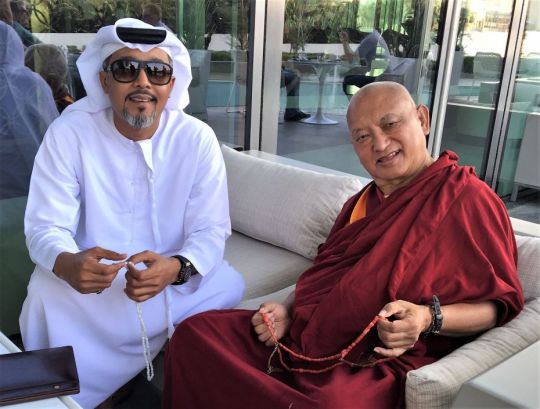
Lama Zopa Rinpoche meets a new friend in Abu Dhabi. Both display their rosaries, the usage of which is shared by Buddhists and Muslims. November, 2016. Photo by Ven. Roger Kunsang.
For Muslims all over the world, Ramadan is a happy time. It just started, on the evening of Friday, May 26, and it runs until late June. Ramadan is the month in which the first verses of the Quran, Islam’s holy book, were revealed to the Prophet Muhammad more than 1,400 years ago. During Ramadan, many Muslims fast from sunrise to sunset and also practice charity: ways to remain aware of God and of the sufferings of the less fortunate.
It is friendly to wish practicing Muslims “Happy Ramadan” or “Ramadan Mubarak” (“Blessed Ramadan”).
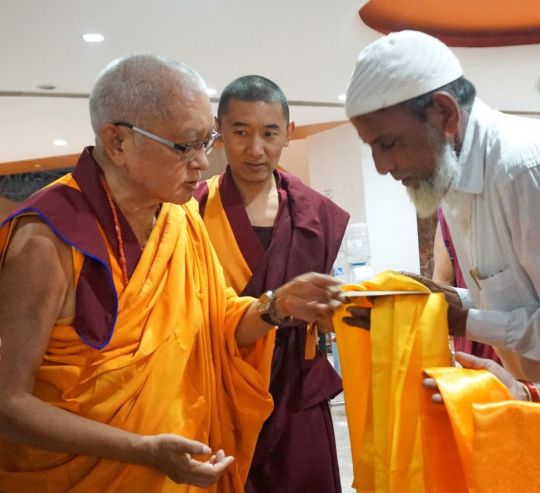
A Muslim student greets Lama Zopa Rinpoche. Bangalore, India, December 2016. Photo by Ven. Lobsang Sherab.
On the value of Islam and other religions to the world, Lama Zopa Rinpoche has explained, “There are many religions in the world, such as Christianity, Hinduism, Islam, and so forth. These different religions are needed. It’s like having different clothes or different kinds of food in a restaurant; we need variety for different people. … We must respect other religions.”
And His Holiness the Dalai Lama? When he was teaching in Strasbourg, France, in 2016, he talked about his concerns about the stereotyping of Muslims. Attendee Laetitia Franceschini, from Toulouse, France, was quoted in a Mandala online article about the Strasbourg teachings. She noted His Holiness’s words about educating people to maintain harmonious relations with others. “I was happy,” she said, “when he spoke about Muslims. His Holiness said that the phrase ‘Muslim terrorist’ is wrong. He said that any person who wants to indulge in violence is not a genuine Buddhist or genuine Muslim. All major religious traditions carry the same message: a message of love, compassion, forgiveness, tolerance, contentment, and self-discipline. It creates stigma for Muslims when one person’s actions brand the whole community. It was inspiring when he spoke about being harmonious with Muslims, and not focusing on one act. That’s very important.”
Lama Zopa Rinpoche also values interfaith work. When he developed his Vast Visions for FPMT, Rinpoche said, “[It would be good] for the centers to arrange regular interfaith dialogues with religious leaders in their local community,” noting that this is one way FPMT can offer service to His Holiness the Dalai Lama and support his objectives.
Happy Ramadan!
Lama Zopa Rinpoche is the spiritual director of the Foundation for the Preservation of Mahayana Tradition (FPMT), a Tibetan Buddhist organization dedicated to the transmission of the Mahayana Buddhist tradition and values worldwide through teaching, meditation, and community service.
24
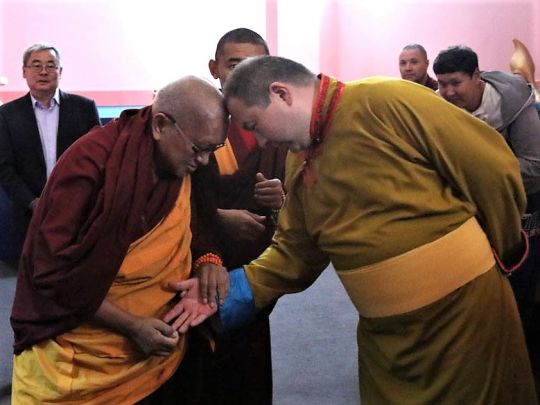
Lama Zopa Rinpoche greeted by Telo Rinpoche in Elista, Kalmykia, Russia, May 2017. Photo by Сохраним Тибет via Facebook.
You can watch Lama Zopa Rinpoche teach live from Moscow starting on Saturday, May 27. The teachings run from May 27 through June 3 and will be live-streamed. Details can be found here: http://en.lamazopa.ru/
Rinpoche’s teachings in Moscow—organized by Ganden Tendar Ling Center—will be streamed on FPMT’s YouTube channel, on Lama Zopa Rinpoche’s Facebook page, and on FPMT’s Facebook page. The live-streamed teachings are scheduled for 7 p.m. local time each evening as follows:
- May 27-June 3, 7 p.m. local time (GMT+3)
Watch here on FPMT’s YouTube channel:
https://www.youtube.com/c/fpmtinc/live
Rinpoche has been teaching in Elista, the capital of Kalmykia, Russia, May 20-24, where he has been hosted by Telo Rinpoche, an important spiritual leader of the Kalmyk people. Kalmykia is a traditionally Buddhist region in Russia.
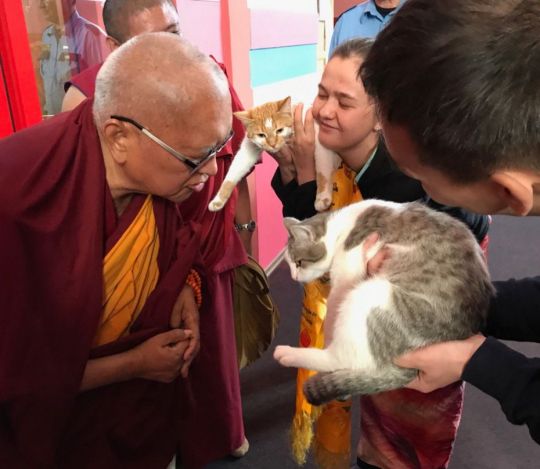
Lama Zopa Rinpoche blessing cats in Kalmykia, May 2017. Photo via Twitter.
Rinpoche last visited Ganden Tendar Ling Center in Moscow in 2015 when he taught on the “Three Principal Aspects of the Path.”
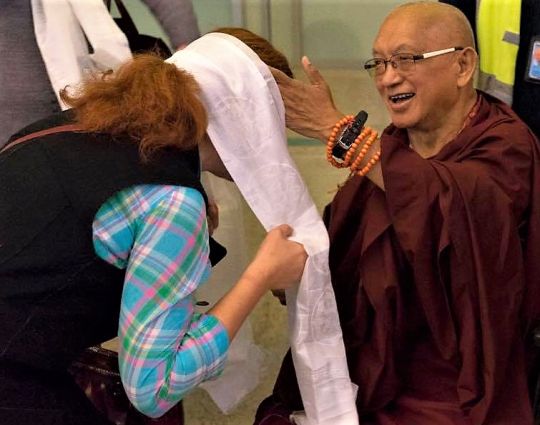
Lama Zopa Rinpoche in Kalmykia, Russia, May 2017. Photo by Mariam Ke via Facebook.
PLEASE NOTE: Live webcasts of Lama Zopa Rinpoche’s teachings are now on YouTube. We will no longer be streaming Rinpoche’s teachings from Livestream.com. Please bookmark this YouTube link for live video of the teachings in Mongolia and Rinpoche’s other future live-streamed teachings:
https://www.youtube.com/c/fpmtinc/live
Rinpoche’s schedule of teachings can be found here:
https://fpmt.org/teachers/zopa/schedule/
Lama Zopa Rinpoche is the spiritual director of the Foundation for the Preservation of Mahayana Tradition (FPMT), a Tibetan Buddhist organization dedicated to the transmission of the Mahayana Buddhist tradition and values worldwide through teaching, meditation, and community service.
- Tagged: animals, lama zopa rinpoche, livestream, russia
22
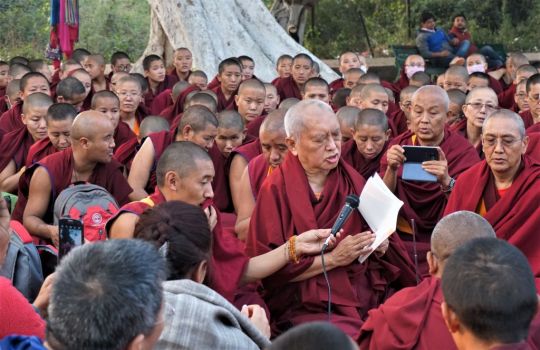
Lama Zopa Rinpoche giving an oral transmission from a Mahamudra text by Panchen Losang Chokyi Gyaltsen, Nalanda, India, January 2017. Photo by Ven. Losang Sherab.
A lung (pronounced loong) is the oral transmission of a text, mantra, or practice by an authorized holder. Lama Zopa Rinpoche explains more about lungs in a video below.
In Tibetan the word for oral transmission is spelled lung (ལུང་). It should not be confused with a different word that sounds similar, lung meaning “wind,” spelled rlung (རླུང་) in Tibetan.
In the video, Lama Zopa Rinpoche emphasizes that lungs come in an unbroken lineage from the Buddha or Lama Tsongkhapa, which gives them blessings. He also mentions that he thinks practices are more effective after we receive a lung—especially if we pay attention while receiving them!
Calling lungs “powerful,” Rinpoche talks in this nine-minute video about the meaning and benefits of lungs and how to receive them. The video is an excerpt from his teachings at the 2016 Light of the Path retreat.
Subtitles of Rinpoche’s words appear in the video if you click “CC” in the bottom right corner, for “Closed Captions”.
Watch Lama Zopa Rinpoche on YouTube as he gives a short talk on lungs:
https://youtu.be/HsMHKfmfwuc
The complete teachings from the 2016 Light of the Path retreat can be found here, including links to transcripts, MP3s, and translations:
https://fpmt.org/media/streaming/teachings-of-lama-zopa-rinpoche/light-of-the-path-teachings-2016/
Register for the 2017 Light of the Path retreat:
http://kadampa-center.org/light-path-retreat-2017
Lama Zopa Rinpoche is the spiritual director of the Foundation for the Preservation of Mahayana Tradition (FPMT), a Tibetan Buddhist organization dedicated to the transmission of the Mahayana Buddhist tradition and values worldwide through teaching, meditation and community service.
- Home
- News/Media
- Study & Practice
- About FPMT Education Services
- Latest News
- Programs
- New to Buddhism?
- Buddhist Mind Science: Activating Your Potential
- Heart Advice for Death and Dying
- Discovering Buddhism
- Living in the Path
- Exploring Buddhism
- FPMT Basic Program
- FPMT Masters Program
- FPMT In-Depth Meditation Training
- Maitripa College
- Lotsawa Rinchen Zangpo Translator Program
- Universal Education for Compassion & Wisdom
- Online Learning Center
- Prayers & Practice Materials
- Overview of Prayers & Practices
- Full Catalogue of Prayers & Practice Materials
- Explore Popular Topics
- Benefiting Animals
- Chenrezig Resources
- Death & Dying Resources
- Lama Chopa (Guru Puja)
- Lama Zopa Rinpoche: Compendium of Precious Instructions
- Lama Zopa Rinpoche: Life Practice Advice
- Lama Zopa Rinpoche Practice Series
- Lamrim Resources
- Mantras
- Prayer Book Updates
- Purification Practices
- Sutras
- Thought Transformation (Lojong)
- Audio Materials
- Dharma Dates – Tibetan Calendar
- Translation Services
- Publishing Services
- Teachings and Advice
- Find Teachings and Advice
- Lama Zopa Rinpoche Advice Page
- Lama Zopa Rinpoche: Compendium of Precious Instructions
- Lama Zopa Rinpoche Video Teachings
- ༧སྐྱབས་རྗེ་བཟོད་པ་རིན་པོ་ཆེ་མཆོག་ནས་སྩལ་བའི་བཀའ་སློབ་བརྙན་འཕྲིན།
- Podcasts
- Lama Yeshe Wisdom Archive
- Buddhism FAQ
- Dharma for Young People
- Resources on Holy Objects
- Ways to Offer Support
- Centers
- Affiliates Area
- Teachers
- Projects
- Charitable Projects
- Make a Donation
- Applying for Grants
- News about Projects
- Other Projects within FPMT
- Support International Office
- Projects Photo Galleries
- Give Where Most Needed
- FPMT
- Shop
Translate*
*powered by Google TranslateTranslation of pages on fpmt.org is performed by Google Translate, a third party service which FPMT has no control over. The service provides automated computer translations that are only an approximation of the websites' original content. The translations should not be considered exact and only used as a rough guide.Look at modern society. Many people put themselves down; that’s their worst problem. You can see this everywhere in the world; people put limitations on themselves, on their own reality.







